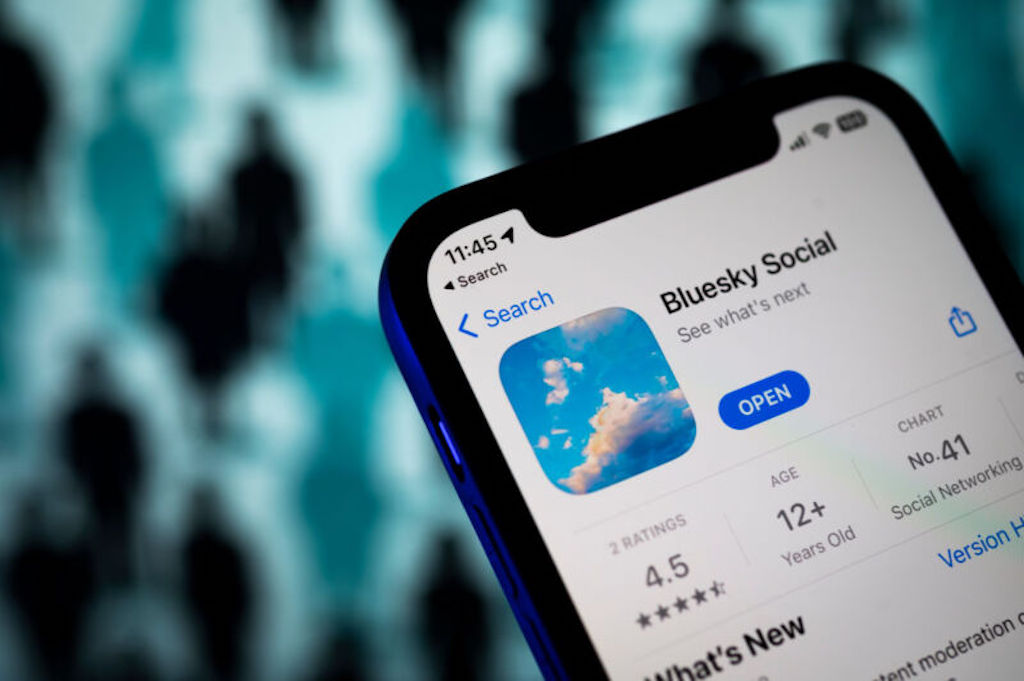Recently, Twitter rival Bluesky experienced its biggest spike in users yet. Between Wednesday and Thursday, Bluesky doubled its user base, Bloomberg reported.
The surge in Bluesky’s popularity came as some of Twitter’s most influential users began joining Bluesky, including writer-comedian Dril, United States Representative Alexandria Ocasio-Cortez, and filmmaker James Gunn.
Some of these influencers may have been seeking to distance themselves from Twitter after the platform gifted many legacy accounts with blue verified badges that falsely labeled the accounts as paid subscribers.
Still in beta testing, Bluesky is currently available to more than 40,000 users, Bluesky CEO Jay Graber told Bloomberg today. There’s much more interest from users, though.
The iPhone app has been downloaded approximately 360,000 times, and the Android app is reportedly a top download after only recently launching in the US, the United Kingdom, and Japan.
Now that influencers are tweeting out their Bluesky handles, though, it’s likely that many more users have joined the waitlist, which is seemingly the only way to get an invite code right now.
It’s possible that beta users will soon have invites to share, too.
The eagerness to find a Twitter replacement has seemed to escalate after Twitter removed and then reinstated verification badges on legacy verified accounts.
Many Twitter users have started joking about getting or wanting Bluesky invites at a time when one of Bluesky’s newest users, model Chrissy Teigen, recently described having Twitter’s blue badge on her account as a form of “punishment.”
wait I’m crying they’re giving them for punishment now !!?!! https://t.co/V2K8zCKScf
— chrissy teigen (@chrissyteigen) April 22, 2023
Beyond celebrities and influencers who felt stung by receiving blue checks they never asked for falsely branding their accounts, even users who never really cared about badges may be more actively seeking a Twitter alternative as the platform grows less reliable.
In the past few months, several news organizations left the platform, many government accounts lost verification, and many apps broke when Twitter turned off its free API.
This week, Mashable reported that Twitter made search unavailable without a login, further restricting access to tweets. Just yesterday, New York’s Metropolitan Transportation Authority (MTA) became one of the first major transportation agencies to stop sharing live updates on Twitter.
In MTA’s press release, acting chief customer officer Shanifah Rieara said that MTA terminated those posting services because “reliability of the platform can no longer be guaranteed.”
But while it’s easy to criticize Twitter’s inconsistencies while CEO Elon Musk tries to find new ways to monetize the platform, Bluesky in its beta form may not be a perfect alternative for users worried about things like impersonation, content moderation, or customizable news feeds.
There’s a reason why Bluesky seems like a great replacement for Twitter. The app is designed to “show how Twitter could have been built”—if Twitter was built on a decentralized system and stored its user data in independent servers and not in a company server, according to a Bluesky blog.
A major perk would be the ability to transition Bluesky account information, including all followers, when users want to switch to a different social platform.
Bluesky suggests this could be done with ease—the way social networks can link friends’ accounts by accessing a mobile phone’s contact list—because users would have more control over their data.
The app was created by Twitter co-founder Jack Dorsey, who helped fund its development through Twitter and remained on the Bluesky board after Bluesky became independent in 2022.
Then, after Musk took over Twitter, Musk seemingly ended Twitter’s relationship with Bluesky. However, some reports suggest there may still be some connection between the companies.
And finally, I think it's worth re-iterating here that Jack is on our board but Jack does not own us, Twitter does not own us, and I am the CEO who made the call to put up a standard social media terms of service before our beta.
Thread on our origins.https://t.co/qcZ8m52Kuj
— Jay Graber (@arcalinea) April 28, 2023
“I think it’s worth re-iterating here that Jack is on our board, but Jack does not own us,” Graber tweeted. “Twitter does not own us.”
Graber’s comments came amidst a thread that was directly responding to some of Bluesky’s earliest users’ biggest criticisms after using the app.
During the beta, users can sign up with an email, create posts up to 300 characters, and access a chronological timeline of posts. Users currently don’t have a lot of control over their Bluesky experience, though, and are not even granted the power to block accounts they don’t want to appear in their timeline.
Eventually, Bluesky plans to give users a choice between different content moderation systems and algorithms they can use to manage content in their feeds.
Until then, users can only opt in or out or request a warning if they want to approve or block content flagged as “impersonation,” “violent/blood,” and “political hate groups,” The Washington Post reported.
Not every user is happy about the current Bluesky experience, and some Twitter users are blaming Dorsey.
One tweet with 3.2 million views as of this writing criticized Bluesky’s terms of service for giving Bluesky “perpetual’ & ‘irrevocable’ license to all your content,” confirming that Bluesky could delete accounts for any reason or refuse to delete accounts, forbidding screenshots and requiring all users to settle disputes through individual arbitration.
BlueSky Terms of Service gives Jack a 'perpetual' & 'irrevocable' license to all your content (posts, name, likeness, pics)
BlueSky can delete your account for any reason, but may refuse to delete it if you ask
You can't screenshot BlueSky
All disputes = individual arbitration pic.twitter.com/mHxYkuA4EM
— Ashley M. Gjøvik (@ashleygjovik) April 27, 2023
Graber responded, telling Twitter users that as the current CEO, Graber made the decisions currently impacting their experience, not Dorsey. “I am the CEO who made the call to put up a standard social media terms of service before our beta,” Graber tweeted.
In the thread, Graber clarified that the terms of service were not meant to be “so confusing and unfriendly,” indicating that Bluesky has “already been working on a second pass over the past few weeks.”
Graber also clarified that Bluesky’s term granting it “rights to user-generated content” allows Bluesky to market the app using user-generated content.
The refusal to delete accounts might happen “for accounts with illegal activity requesting a delete.”
But other negative feedback seemingly reflected not user confusion but users discovering they had a distaste for some of Bluesky’s choices. Bluesky, for example, doesn’t allow screenshots because Bluesky is trying “to prevent bad actors from spoofing our app’s identity.”
Regarding individual arbitration, Graber only said that Bluesky is “considering a new provision where the arbitration has to take place in the location of the party being sued,” rather than address the seeming question at hand, which is why Bluesky is not allowing mass arbitration.
On top of user concerns with its terms of service and content moderation, Bluesky also has an impersonation problem, Bloomberg reported, with several accounts flagged as fake, including an account impersonating MySpace co-founder Tom Anderson. Bluesky’s response to impersonation is seemingly to slap a warning on the account.
In the end, users will decide which platform to support—or if neither platform has acceptable standards.
On Twitter, Musk is seemingly steering the platform toward a future that only paid subscribers will find appealing. But until Bluesky is fully developed and users can experience all of its touted features, Bluesky’s best feature currently seems to be that Musk has nothing to do with it.
MARKETING Magazine is not responsible for the content of external sites.
After 20 years of evolving technology, shifting market trends, and adapting to changing consumer behaviour, the media landscape has nearly reached saturation.
We’ve optimised to the fullest, providing advertisers with abundant choices across technology, platforms, data-driven marketing, CTV, OTT, DOOH, influencer marketing, retail, etc.
Media specialists have diversified, but with more options comes the challenge of maintaining income growth. The industry is expanding, but revenue isn’t keeping pace.
Now, we’re at a TURNING POINT: time to explore and harness new sustainable revenue streams. While GroupM forecasts a 7.8% global ad revenue growth in 2024, challenges like antitrust regulation, AI and copyright issues, and platform bans persist.
Collaboration is key: partnerships that thrive on synergy, shared values, and aligned goals are becoming increasingly essential.
Hence, the Malaysian Media Conference, in its 20th year, has assembled the partners and players under one roof on October 25 for a day of learning, sharing, and exploring.
REGISTER NOW









